- Home
- Bronwyn Scott
Awakened by the Prince's Passion Page 2
Awakened by the Prince's Passion Read online
Page 2
‘I know a doctor, a specialist who can perhaps help you,’ the Prince said when the servants had gone. ‘After the Peninsular Wars, many of our soldiers suffered memory loss from the trauma of battle. I’ll arrange for a visit today, if you’d like. I will also arrange for a lady’s maid and some clothes until we can get you to a dressmaker. I already have my footmen preparing a hot bath for you in your chambers.’
* * *
Embarrassing tears stung Dasha’s eyes. How silly it was to cry now over a bath and clean clothes and brandy-laced milk when there was so much loss to mourn. Her home, her country, her mind, her family. She’d not cried when Varvakis had told her. She’d been numb with horror, not only at the nature of their deaths, but at her lack of memory. She couldn’t remember them, she could only mourn them as an outsider mourned the inherent wrongness of a tragedy. She’d not cried when the boat they’d journeyed in from Ekaterinodar foundered in the Black Sea. She’d been brave for weeks. She’d not broken down once, but Prince Pisarev had managed to reduce her to tears in a matter of sentences over the smallest of kindnesses. She willed the tears away with a fierce determination.
‘Thank you for your hospitality, Prince Pisarev. It means more than you know.’ She rose to leave, knowing they would discuss her when she left. But it was either stay and fall apart in front of the Prince, or leave and preserve her dignity.
The Prince stood with her, capturing her hand in his. She felt the warm strength of him again flowing into her. ‘It is my pleasure. Please ask for anything you need. We will speak again later, when you’re settled.’ What a courtier he must have been. He was the sort of man who was able to arrange things for others without making them feel small or dependent. The sort of man who knew how to take charge without diminishing people. That could be dangerous. She would do well to remember how easily he wielded that power. She wanted to be under no man’s thumb. But that was a problem for later. At the moment, she could afford to bask fully in his generosity. Only a foolish woman turned down the offer of a hot bath after weeks of travel and, whoever she was, Dasha was no fool.
Chapter Two
‘The Princess is here. Congratulations, Captain. You’ve made it this far. Now we need to talk about why. Why me? Why London when there are places of safety far closer to Kuban?’ Ruslan put the long-forgotten glass in Captain Varvakis’s hand and picked up his own, taking charge of the conversation and its direction. Now, he really did need a drink. The Princess was a woman who could take a man by surprise and not let go. Even as bedraggled as she was from travel, there was beauty to her wildness: the ash-blonde hair, the sharp emerald depths of her eyes, the willowy strength of her body, slim and strong like Damascus steel when she’d fought him. But her most appealing attribute was her courage, her confidence. She’d not hesitated to speak for herself, or to challenge him with the truth—that she was a broken princess, a woman with no memories. It was a formidable circumstance for her to be in, and for him, given his family’s rather recent, rather tragic relationship to the throne.
‘What do you expect me to do with her?’ Ruslan mused out loud. Surely, Varvakis was not entirely oblivious to his severed connection to the royal family—a relationship his family had not chosen to sever, but one that had been deliberately cut off by the Tsar himself, disgracing the House of Pisarev. It was a disgrace Ruslan would erase if given the opportunity. Ruslan had his own plans, his mind was already whirling through options, but it would be interesting to see what Varvakis’s intentions were.
‘We keep her safe for Kuban,’ Varvakis said without hesitation, ‘until it is time to return and guide the country to peace.’ It was what one would expect from a man like Varvakis, a reliable officer with his country’s best interests at heart, a patriot to the core.
Ruslan made a mental note to confer with Nikolay, who’d been a captain in the Kubanian cavalry. Perhaps Nikolay knew of Varvakis and his reputation for the truth. ‘Well, then, it’s no wonder you came looking for me.’ Keeping a princess safe was no simple matter. ‘Safety’ could take a variety of forms.
‘As to why we’re here; you are the best. Your work in the underground is legendary among those who know.’ Captain Varvakis complimented deferentially, aware that he addressed his superior. ‘If there is anyone who can keep a fugitive alive, it’s you. Allow me to say, your reputation precedes you.’ Varvakis did not refer to his reputation as a prince, a man known for his royal arrangements, although he had a reputation for that as well. If the Tsar wanted a grand entertainment, or a hunt organised, Ruslan had seen to it. Everyone knew Ruslan was an expert organiser and an expert organiser had an exquisite network of connections.
As impressive as that accomplishment was, it was not the one Varvakis alluded to, but his other reputation as part of the Union of Salvation, the liberation underground. He helped certain people, who might otherwise find it unhealthy to stay, to leave Kuban. People like Prince Dimitri Petrovich’s sister, Anna-Maria, who needed to escape an unwanted marriage; people like his friends, Nikolay, who would have been tried for treason and found guilty, or Illarion, who’d committed lèse-majesté with a poem. He was known to those who faced danger.
And now he was to help the woman upstairs. Fugitive, future Queen, daughter of the man who’d cast his family into disgrace after generations of loyal service. Dasha Tukhachevskenova lived life in the extreme, at once both a woman with and without a country, a woman with a history and without, a woman with and without power. It was something Ruslan knew a little about. He, too, was a prince without a country. He’d chosen to vanish and, in doing so, he’d given up his claim to all he knew and, for the most part, all he had. The only difference between him and the Princess was that he remembered it.
Ruslan swirled his glass, watching a centrifuge form in the centre. ‘She remembers nothing at all?’ It was a question he’d not wanted to ask her. It seemed too intrusive. But he had to know if he was going to plot accordingly. It would be difficult to persuade others to follow a woman in her condition.
‘Nothing of merit,’ Varvakis admitted. ‘She remembers snatches of what happened. She dreams of the fire. It’s what gives her the nightmares, but she recalls nothing substantial.’
‘Except what you’ve told her?’ Ruslan asked pointedly. That was an interesting angle to consider. Her memories would come from Varvakis’s telling. He was the keeper of what she understood to be true. A Latin phrase ran through his head from John Locke: tabula rasa. A blank slate in the hands of the wrong man was a dangerous and powerful weapon. The Princess would believe what she was told. She had no alternative, no base to check the knowledge against. It was more important than ever to meet with Nikolay and determine if Varvakis could be trusted. Already Ruslan sensed the Captain had his own agenda.
‘As for protection,’ Ruslan went on, ‘I think we have two choices. First, we can assume Rebels have noticed her escape and have chosen to follow her to London for the purpose of assassinating her. That means we must keep her hidden. The other option is to assume we are beyond the Rebels’ reach. We take her out in society, such as it is in the autumn, and drum up support for her cause. We protect her by building a network abroad that will help her establish her claim to the throne when she returns.’ Such actions would make a Charles Stuart of her. Hopefully with better results.
‘Or we do both,’ Ruslan continued. Either option pointed towards Varvakis’s agenda: restore a Tukhachevsken to the throne, this time, one who favoured modernisation and reform. It hardly mattered what Dasha’s political beliefs were. She didn’t remember them. Varvakis would have the power to reshape those beliefs into a platform the country would accept. Ruslan smiled neutrally at the Captain over the rim of his glass, giving away none of his concern over such a strategy. ‘When do you intend to go back?’
‘That will depend on whatever news we receive about the revolution,’ Captain Varvakis said. ‘A queen must always be ready to serve her country.’ Or
those who controlled her, Ruslan thought cynically. He pitied the woman upstairs bathing. Was she aware Varvakis viewed her as an artefact to be protected until it was time to be revealed? Did she share those views? That was what Ruslan needed to know next. He had no intention of promoting a restoration if the monarch in question was unwilling. Nor did he have any intention of promoting a monarch with a false promise simply for the expedience of putting a Tukhachevsken back in power. Kuban had risen up to claim a new life. He would not destroy that effort. It was a direction he and his family had wanted for the country, had sacrificed for.
Ruslan pushed a hand through his hair, his fingers meeting tangles. He’d done enough business in his pyjamas for one night. It was time to get dressed. If it was going to be a long day, it could at least be a productive one.
* * *
Three hours later, he was back in the drawing room, dressed and organised and waiting for the Princess. He’d sent word that she should come down at ten. The mantel clock was just striking the hour. A rustling at the entrance drew his eye and then stole his breath. The woman framed in the doorway barely resembled the ragged girl who’d gone upstairs. Her hair was done in a knot on top of her head, exposing the slender length of her neck, and a few curls had been left down to frame her face and soften the sharp heart-shaped angles of her jaw and chin. The rose gown made her skin glow and Ruslan found his eyes riveted on the simple strand of pearls that lay against the base of her throat. In a word, Dasha Tukhachevskenova was stunning.
‘Your Highness.’ Ruslan inclined his head from his position at the fireplace mantel. But Captain Varvakis went to her more formally and offered his hand.
‘Have the two of you decided my fate?’ There was an edge to her coy tone as she swept forward, disregarding Varvakis’s hand. Ruslan suppressed a smile. The Princess might have forgotten precise, physical memories, but she’d not forgotten what it was to be at court, where one had to watch every word, every association. There was hope in that. The Princess might prove to be less malleable than Varvakis believed.
‘I would not be so bold as to decide anything for you, Your Highness.’ Ruslan made a small bow of respect. ‘However, I have sent for a physician who is both discreet and knowledgeable about memory loss. Would you care to take the air in the rose garden while we wait?’ He gestured towards the wide French doors that opened into his prized garden. Garden space was at a premium in the city; he’d been lucky to find a home with one.
‘I would like that very much.’ The Princess shot him a considering look that said she guessed at a larger reason behind the offer. But it was a price she was willing to pay. Ruslan wondered what she wanted in exchange. Perhaps she, too, was interested in assessing him just as he was interested in assessing her—without the screen of Varvakis’s presence.
Outside, the sky was overcast as they walked the paved pathway that wound through his collection of roses. They made small talk as he introduced her to each type. ‘This one I got from a Lady Burton, she breeds them in Richmond. I call it the Debutante for its unique shade of white. But this one, I have grafted myself.’ Ruslan stopped at an ivory rose tinted with pink edges.
‘It’s beautiful. Does it have a name?’ Dasha bent to smell the flower, her eyes closed, long lashes fanning her cheek. If he were a painter, he’d want to capture the image of serene beauty she presented in that moment. An artist like Illarion’s wife, Dove, would appreciate the rose of her gown and the pink highlights on the flower. But he was not an artist. He was a thinker, an arranger.
‘Not yet.’ He held her gaze as she straightened. ‘Perhaps I should call it the Dasha, or the Princess. Your beauties complement one another.’
Dasha laughed. ‘Very nicely done, Prince Pisarev, but I don’t think you brought me out here to flirt.’ He would have, though, if circumstances had been different, if there hadn’t been so much at stake or so much unknown, if she’d simply been another pretty London debutante. She was just the sort of woman he liked: pretty and fresh, but not vacuous. Such traits were rather rare in fashionable society, or anywhere, actually. As a prince close to the Tsar, Ruslan had spent his days at court escorting the jaded wives of ambassadors and visiting generals. He knew just how rare such a woman was.
Ruslan chuckled. ‘I don’t think you came out here for flirtation either, so why don’t we cut line. Why did you come out?’
They began to stroll again, her arm tucked through his, to create the impression to anyone who might be looking on that nothing significant was taking place. It was a tactic he had used often to woo a secret or two from those worldly wives of diplomats. At court, one could never be sure who was listening.
The Princess wasted no time getting to her point. ‘Do you know me?’
The blunt sincerity of the question caught Ruslan entirely off guard. He’d expected questions about plans and plots, perhaps even an interrogation of his credentials. He slid her a considering glance. She would not want his pity, although he was tempted to give it. She’d been tugging on his somewhat less than objective heartstrings since she’d fallen into his arms, although he’d do well to resist the sentimental urge. Still, he wasn’t so heartless as to not recognise how horrible it must be to not know oneself. He admired her confidence in the face of such uncertainty, a reminder that she did know herself in some way, innately and instinctively if not exactly.
‘I’m sorry, I don’t.’ Ruslan gave her the truth, although it was not the answer she hoped for. He covered her hand with his where it lay on his arm. ‘I knew your brothers: Peter, Grigori, Vasili. We grew up together.’ He paused, his earlier emotions of the morning threatening to get the better of him when he thought of their deaths. ‘I am genuinely sorry for your loss.’
‘Forgive me, but you have me at a disadvantage.’ She stopped walking and turned to face him, grief etched in her gaze, but a different grief than one might expect. This grief was twofold. ‘It seems you know more about my family than I do. I do not know if they were good or bad, kind or cruel, but I do know no one deserves to die that way. Don’t you see, Prince Pisarev? I can’t fully mourn them, not yet, not until my memories return.’ She shrugged. ‘Will you think I am cowardly, if I say it’s a blessing I can’t remember? Perhaps I am somehow spared the pain of loss.’ She looked away to a point beyond his shoulder, disappointment shadowing her green eyes. ‘I was hoping you knew me.’
‘I would have been too old to know you. You would have been only ten when I was at court with your brothers and younger still when I was running about the palace with them.’ Even at that age, he’d been arranging entertainment for the boys, always the ringleader coming up with a new adventure to fill the days. Those had been golden years, as a child growing up in the palace, his family in high favour with the Tsar. Those years had burned brighter still when he’d come of age, home from university, filled with ambition, before his family had fallen from grace. She would have been too young, too isolated to know of it. ‘Besides,’ Ruslan added, ‘you were raised in traditional fashion and kept out of public view.’ As were all gently bred Kubanian girls of high birth. They were sequestered away to the point of oppression. It was one of the contentions that had seen his friends, Nikolay and Illarion, exiled from Kuban, seen his father imprisoned and out of favour and now it had become one of the central issues that had sparked the revolution.
‘It is not surprising I don’t recognise you.’ He racked his mind for the least bit of memory and came up with one. ‘I do recall one Christmas, though. You were perhaps seven. We were home between terms from our respective universities and it had snowed. We had a snowball fight on Christmas Eve, with you, Grigori and Vasili against me and Peter. You wore your hair in braids with blue bows.’ He smiled fondly at the memory. ‘Kuban gets the best snow, not the wet stuff we have here in England.’
‘It sounds lovely, like something I’d want to remember.’ Dasha looked away, her gaze troubled.
Ruslan was quick to
offer her consolation. Consolation came easy to him. He’d offered reassurances to other people in seemingly hopeless situations over the years. ‘It’s only been a few weeks. These things can take time. Sometimes the best remedy is to not try too hard to remember, to just let it happen.’
‘You are very kind.’ She offered him a faint smile and he did not bother to correct her. He was not kind. He was merely doing his job. Pretty as she was, she was just another project like all the other people he’d ferried out of Kuban over the years. The difference was that while they had wanted to get out, she wanted to get in.
‘And yourself, Prince Pisarev? It’s your turn. Why did you want to get me alone?’
‘I wanted to know your opinions about Varvakis’s plans. He would see you restored to the throne. That is an ambitious, if not dangerous undertaking, and one I would not support without your consent. Is that a road you wish to travel?’
They had reached the edge of the garden where a fence separated his luxurious home from the alley. She paused to fiddle with the ivy growing rampant against the wood. ‘I should wish it, shouldn’t I? A princess should want to go back, I should want to rally people to my cause, to my throne. Perhaps I should even want to avenge my family.’
‘But you don’t want those things?’ Now they were getting to the heart of it; not just her fear, but her doubt of her capabilities.
‘No, I don’t. Right now, anonymity is appealing. I would rather fade into nothingness than return to a place that might prefer to drag me out on my lawn and finish the task they started instead of negotiate with me, simply because of my father’s policies.’ She paused and gave him a reflective stare. ‘What sort of princess doesn’t want to go home or rule her people? What sort of princess chooses anonymity?’

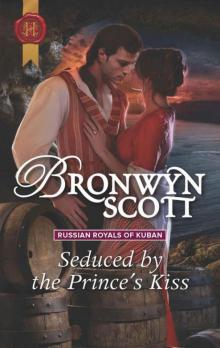 Seduced By The Prince's Kiss (Russian Royals 0f Kuban Book 4)
Seduced By The Prince's Kiss (Russian Royals 0f Kuban Book 4)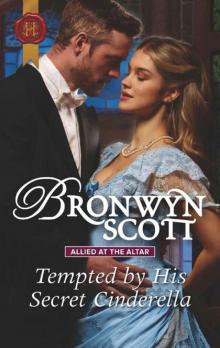 Tempted By His Secret Cinderella (Allied At The Altar Book 3)
Tempted By His Secret Cinderella (Allied At The Altar Book 3) The Secrets of Lord Lynford
The Secrets of Lord Lynford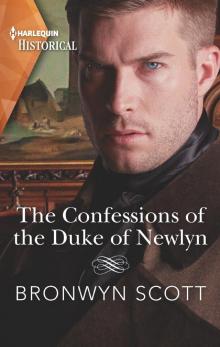 The Confessions of the Duke of Newlyn
The Confessions of the Duke of Newlyn The Passions 0f Lord Trevethow (The Cornish Dukes Book 2)
The Passions 0f Lord Trevethow (The Cornish Dukes Book 2)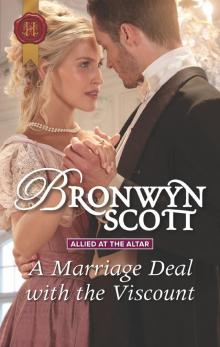 A Marriage Deal with the Viscount--A Victorian Marriage of Convenience Story
A Marriage Deal with the Viscount--A Victorian Marriage of Convenience Story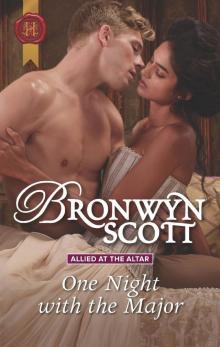 One Night with the Major
One Night with the Major The Passions of Lord Trevethow
The Passions of Lord Trevethow Grayson Prentiss's Seduction
Grayson Prentiss's Seduction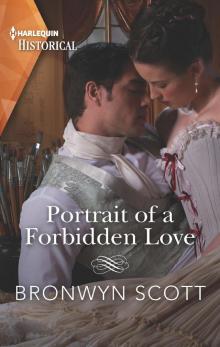 Portrait of a Forbidden Love--A Sexy Regency Romance
Portrait of a Forbidden Love--A Sexy Regency Romance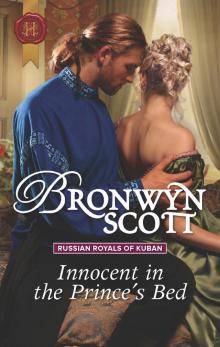 Innocent in the Prince's Bed
Innocent in the Prince's Bed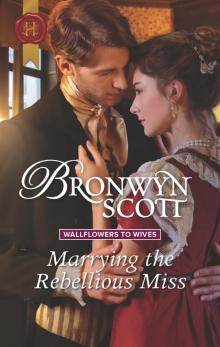 Marrying the Rebellious Miss
Marrying the Rebellious Miss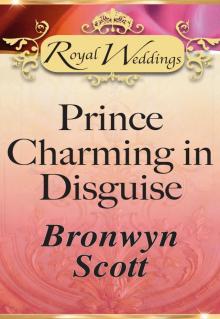 Prince Charming in Disguise
Prince Charming in Disguise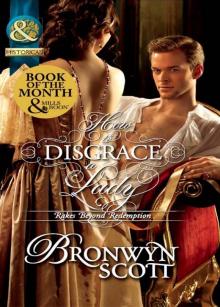 How to Disgrace a Lady
How to Disgrace a Lady Secrets of a Gentleman Escort
Secrets of a Gentleman Escort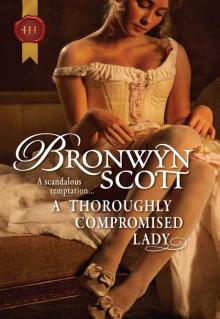 A Thoroughly Compromised Lady
A Thoroughly Compromised Lady Rake Most Likely to Seduce
Rake Most Likely to Seduce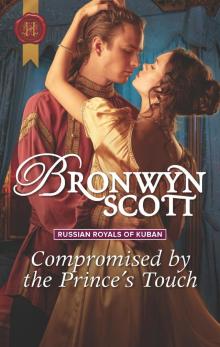 Compromised by the Prince's Touch
Compromised by the Prince's Touch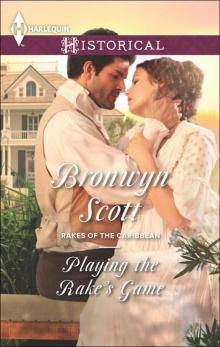 Playing the Rake's Game
Playing the Rake's Game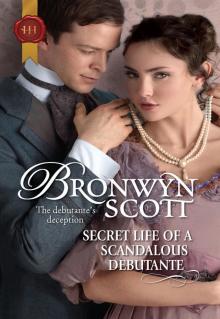 Secret Life of a Scandalous Debutante
Secret Life of a Scandalous Debutante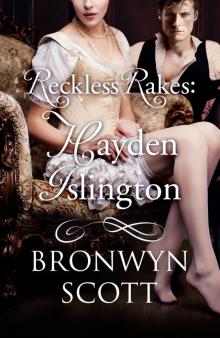 Reckless Rakes - Hayden Islington
Reckless Rakes - Hayden Islington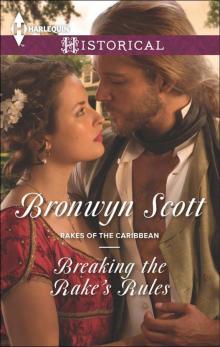 Breaking the Rake's Rules
Breaking the Rake's Rules Arabian Nights with a Rake
Arabian Nights with a Rake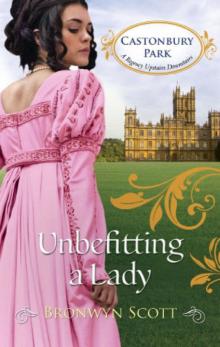 Unbefitting a Lady
Unbefitting a Lady Unbuttoning the Innocent Miss (Wallflowers to Wives)
Unbuttoning the Innocent Miss (Wallflowers to Wives) London's Most Wanted Rake
London's Most Wanted Rake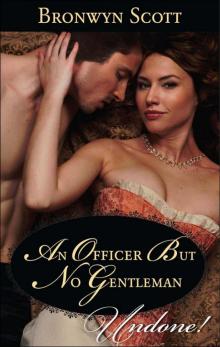 An Officer but No Gentleman
An Officer but No Gentleman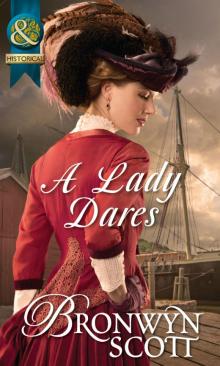 A Lady Dares
A Lady Dares A Most Indecent Gentleman
A Most Indecent Gentleman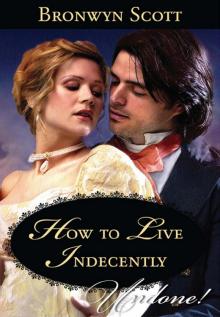 How to Live Indecently
How to Live Indecently Rake Most Likely to Sin
Rake Most Likely to Sin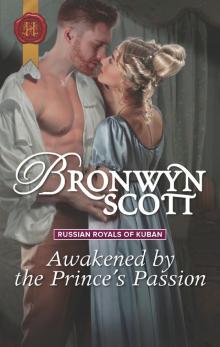 Awakened by the Prince's Passion
Awakened by the Prince's Passion Bronwyn Scott's Sexy Regency Bundle
Bronwyn Scott's Sexy Regency Bundle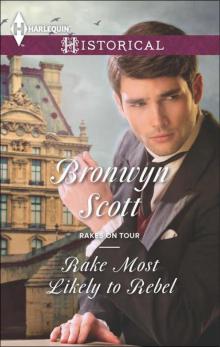 Rake Most Likely to Rebel (Rakes On Tour Book 1)
Rake Most Likely to Rebel (Rakes On Tour Book 1)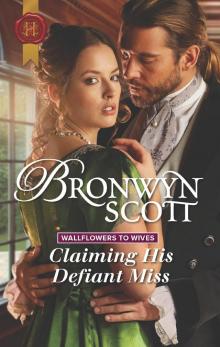 Claiming His Defiant Miss
Claiming His Defiant Miss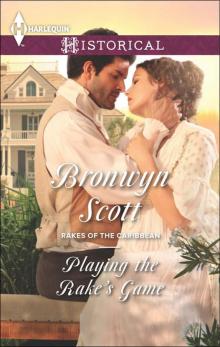 Playing the Rake's Game (Rakes Of The Caribbean Book 1)
Playing the Rake's Game (Rakes Of The Caribbean Book 1)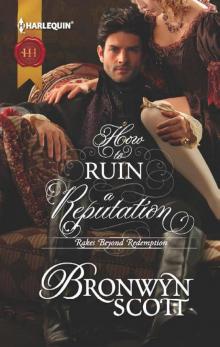 How to Ruin a Reputation (Rakes Beyond Redemption)
How to Ruin a Reputation (Rakes Beyond Redemption) Wicked Earl, Wanton Widow
Wicked Earl, Wanton Widow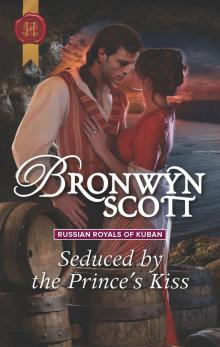 Seduced by the Prince's Kiss
Seduced by the Prince's Kiss